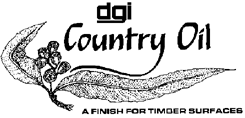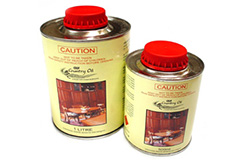DGI COUNTRY OIL
a blend of urethane fortified natural oils
provides a natural / country look to compliment most timbers
gloss level can be varied to choice
completely dry to touch after curing
maintains previously oiled timber surfaces
resistant to water, most chemicals and stains
very easy to apply with no mixing
readily available in cans of 500ml, 1litre and 4litres
comes with full, easy to follow instructions
provides a finish that is easy to clean and maintain
rejuvenate treated surfaces by further simple applications


DGI Country Oil is formulated as an alternative to two-pack polyurethane. Although not quite as tough, it is far easier to maintain.
Our unique formula is a blend of urethane fortified natural oils which is resistant to water, most chemicals and stains.
It gives a low sheen finish using the recommended application. Different gloss levels can be achieved simply by varying the degree of cut, or by buffing.
It is ideal for coating untreated timber surfaces as well as maintaining previously Country Oil treated wood.
Being an oil base, DGI Country Oil is easy to apply and will give an excellent finish without the difficulties or expense associated with the usual ‘sprayed’ furniture finishes.
Application
Easy to apply …
- Prepare the benchtop by sanding all seen faces and edges through grits from 80, 120, 180 and 320. Lay the bench upside down on a workbench and clean free of dust.
- Shake can well, With a clean brush apply two coats of DGI COUNTRY OILto bench underside, all edges and inside of cutouts allowing 3-4 hours between coats, Always brush with the grain.
- Turn the bench over to expose the face immediately after the second coat whilst still wet. Light sand with 180 grits and 320 grits paper to remove any oil runs or scratches caused when coating the bottom.
- Clean free of dust and immediately apply the first coat as in step 2 above. Do not leave overnight in an unbalance state. Allow at least 8 hours to dry, then light scuff with fine 00 grade steel wool or 400 grit wet-dry paper working with the grain. Clean free of dust and repeat for two more coats.
- Using steel wool as the applicator, apply the final coat rubbing with the grain in order to obtain a smooth finish. Then immediately wipe off any excess with a clean rag to give a nice even appearance.
- If a higher gloss level is desired, either apply final coat by brush, or buff with lambswool / polish to higher gloss.
- Stand back and admire your handiwork. If any unevenness or blotchy patches are evident, these are caused by not wiping off uniformly. To remedy, repeat steps 5 and 6. Wait at least 24 hours before using your bench and treat with care for another few days to allow full curing.
Maintenance
Easy to maintain …
Your DGI COUNTRY OIL finished benchtop is easily maintained by wiping clean with water and/or diluted liquid detergents as required. Avoid products that contain silicon compounds such as ‘Mr. Sheen’.
Remember, as with any benchtop always use a cutting board when preparing food. We also recommend using a stand under electrical appliances such as kettles. For repairing impact damage etc., refer to DGI Leaflet No. 5 (REPAIR GUIDE). Surfaces should be re-oiled whenever signs of drying out, excess dirt or lifelessness are observed.
Such maintenance can be done regularly and involves wiping on a thin coat of oil and finishing with a fine steel-wool pad; excess oil, as always, should be wiped off.
Where surfaces have become very poor because of exposure, neglect or abuse then sanding back and retreating should be done.
Regardless of damage that may occur, repairs are relatively simple. Minor scratches can be buffed out with an abrasive polish or touched up.
If impact damage occurs (dents – where timber is compressed), this can be restored with a damp cloth and very hot iron. By placing the cloth over the dent and ironing over it, water vapour is forced into the fibres and the timber will ultimately restore itself to normal. Keep the cloth damp – a spluttering sound is normal.
